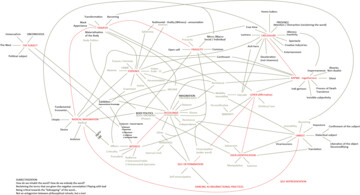Decolonize: operate on the nodes of hegemonic aesthesis. Decoloniality: program of hybrid and discontinuous tactics that traverse materiality and writing, memory and archive, history and affect. Decolonization: process of subjectification Note: The subject of the decolonial revolution does not exist. It is produced in the process of decolonization.
Program:
1. Produce a new body, intervening precisely where the techniques of racialization and sexualization divide up affects and design the hierarchies in the world.
2. Activate and invent an archive that serves the memory of this body. Intervene in the technologies that silence resistances. Reappropriate the languages and voices of distinct micropolitical struggles. Understand their contributions to the decolonial program.
3. Counteract the symptoms of the colonial wound with writing as direct action. Rewrite-inscribe to restore the erasure. Traverse the invisible, inaudible and unsayable fields of coloniality. Invent the archive.
4. Open multiple spaces for the invention of decolonial processes of subjectification. Write, resist, create alliances and modify affects.
The program of action for operating within contemporary coloniality begins by fragmenting the binary code through which we understand the colonial problem in the neoliberal era. This is a binary code of simple divisions between the past and the present, the north and the south, the first and the third world. The process of decolonization puts into practice various forms of antiracist, migrant and subaltern oppositions. However, these strategies do not succeed in modifying the Eurocentric terms of aesthesis. Multiple decolonial tactics must operate at the base of this binary system. Multiple decolonial strategies must intervene precisely into those nodes that are most vulnerable to hegemonic aesthesis.
Decolonizing aesthesis seeks to liberate spaces for reinventing subjectivities that escape the logic and the hegemonic affects produced by racial and sexual hierarchization.
If the subject of the decolonial revolution does not exist it is because it must be produced through a hybrid, discontinuous and dehierarchization program that operates on various levels: between the dominant narratives of history and aesthesis; between the conditions of production of knowledge and the materiality of the body. If this body is marked by the system of writing that we know as the colonial wound, the subject of decolonization is produced and invented through this very same process of writing, of reconstituting and inventing the archive.
Given that hegemonic aesthesis extends its effects to the anticolonial and antiracist debates by generating discourses rooted in sentiments of guilt and revenge in the best possible case, it has become necessary to think decoloniality as a process that should be activated outside of this aesthesis. While the debt must be paid, its collection must also occur outside of the non-producing circuits of guilt and revenge in order to invent decolonizing subjectivities.
Subjectification operates within the decolonial program disturbing modern, humanist and Eurocentric aesthesis and creating a short circuit in the flow of modern-colonial affect.
There is no decoloniality within the present system of affects. Nor is there decolonial history. The tactical narrations inscribed by micropolitical struggles have shattered the linearity of history. Due to the persistence of the colonial wound in constituting the body, disobedient sexualities, anti-racist movements, radical feminisms and lesbian grammars have emerged consistently. From the very first moment of oppression, these wounded bodies have developed practices of resistance constituting a multitude of voices, writing and forms of opposition that have not only resisted processes of normalization but have invented methodologies of self-production: bodies that reject the colonial wound. Every attempt at subjugation and erasure has inspired poetic-political response. Every attempt to reaffirm hegemonic aesthesis has been answered with a poetic-political intervention. An act of writing. A mode of operating on the nodes of hegemonic aesthesis. This is the archive of the knowledge of resistance accumulated by the critical diaspora.
Micropolitical struggles work in radical ways to rewrite memory and confront the wound through writing: making a new body, initiating a process of decolonial subjectification, operating on the nodes of hegemonic aesthesis.



